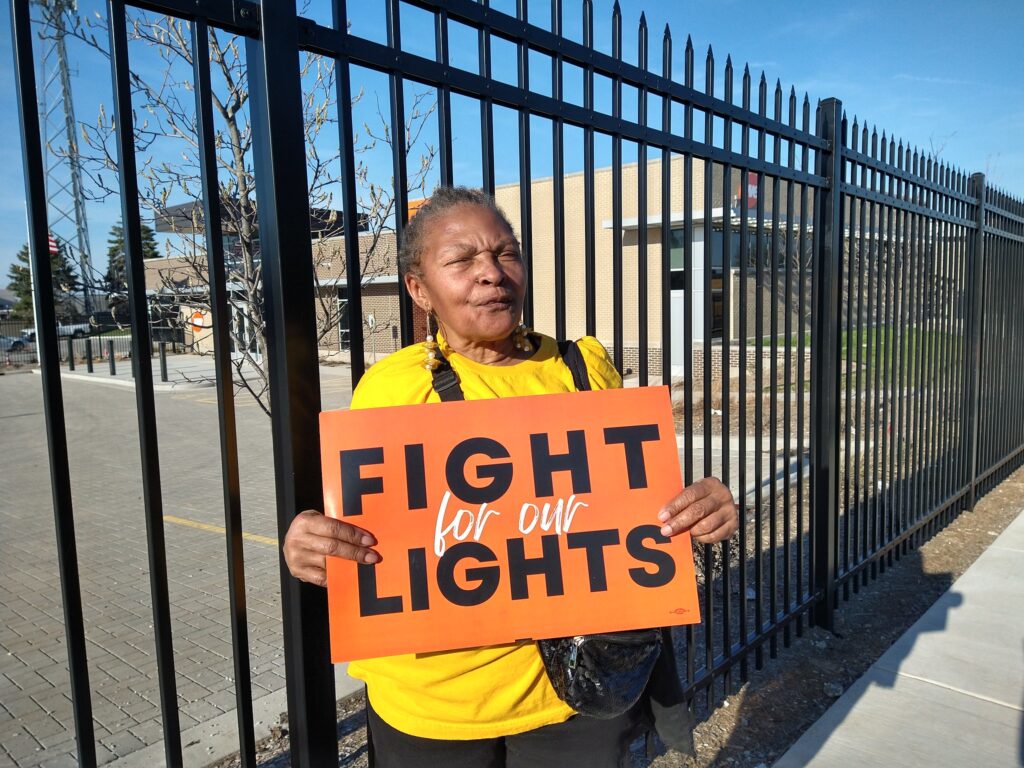Groups Urge We Energies to End Shutoffs For Nonpayment
Utility's 11% hike in rates is 'outrageous,' could leave many unable to pay, advocates say.

Geneva Jones, who lives in Lindsay Heights, said a recent utility bill was $499. Such high prices force her to juggle bills to keep the lights on, a roof over her head and food in the pantry, she says. Photo by NNS.
The annual winter moratorium of utility disconnections ended on April 15. This means We Energies can now legally disconnect residential power for nonpayment.
However, several community groups are urging We Energies not to shut off utilities for nonpayment because of rising prices on other necessities such as food and rent.
For instance, at a protest outside the We Energies location at 3100 W. North Ave. two days before the moratorium ended, groups such as North Side Rising, Citizen Action of Wisconsin, Wisconsin Green Muslims and Faith in Place urged residents to “fight for our lights” to a continual chorus of horns from passing cars.
Earlier in the day, the groups circulated an open letter to the We Energies Board of Directors that called for a commitment “to dramatically decreasing the number of electric shutoffs” and for measures to reduce rates, weatherize old homes and provide energy efficient alternatives such as solar to Milwaukee homes.
11% rate increase
The end of the moratorium marks the first time We Energies and other utilities in Wisconsin can lawfully disconnect utilities for nonpayment since an 11% residential rate increase went into effect in January.
In Milwaukee, the rate increase was unpopular. A majority of speakers at community listening sessions spoke against it, while primarily shareholders or nonprofit groups that receive funding from We Energies spoke in favor. The City of Milwaukee also formally filed a statement against the rate increases.
Brendan Conway, a spokesman for We Energies, said the utility company has helped customers behind on their bills by sending $4 million to the Keep Wisconsin Warm/Cool Fund, and that there is energy assistance available through the state.
Conway also noted that customers can enter a payment plan if they are worried about paying their energy bill.
“Any customer concerned about their bill should contact us right away. Customers who enter into a payment plan are not at risk of disconnection,” he said.
‘These prices are outrageous’
Keviea Guiden, energy burden organizer at Citizen Action Wisconsin, led the protest outside of We Energies’ Metcalfe Park location and is one of those who signed the letter. She noted that utilities are not the only bills increasing, pointing to rising costs of rent, food, car insurance and recent cuts to FoodShare that have increased traffic at food pantries.
This results in an often unmanageable burden on low-income residents, seniors and those on a fixed income, she said.
“These prices are outrageous, and how are we to pay these prices when there’s no change in income?” Guiden asked.
Geneva Jones said that a recent utility bill for her Lindsay Heights home was $499. Because of their age, many homes in the Lindsay Heights neighborhood aren’t efficiently weatherized, leading to expensive utility bills like this one.
For Jones, a bill this large makes it difficult to also pay her bills for other necessities. This leads to her juggling bills month to month to keep the lights on, a roof over her head and food in the pantry.
“In the energy-burdened community, we juggle bills to make sure everyone gets paid,” she said.
Maria Beltran, who also lives in Lindsay Heights, said disconnections also affect a person’s health.
Beltran sleeps with a continuous positive airway pressure, or CPAP, machine. This machine relies on electricity, and without it, Beltran fears what might happen after she goes to sleep.
“I don’t want to die in the middle of night,” she said.
For more information
Tips on what to do if faced with an energy shut-off.
Groups urge We Energies to end shut-offs for nonpayment was originally published by the Milwaukee Neighborhood News Service.
If you think stories like this are important, become a member of Urban Milwaukee and help support real, independent journalism. Plus you get some cool added benefits.






















Considering WE Energies gave away more than $30 million last year to charities, this idea is not bad. How nice that WE plays Santa Claus with our money. If they have so much to just give away they can help some people on hard times.
All should enter into some type of payment plan regardless j the amount. The idea you can consume unlimited amount of electricity and then ask taxpayer to pay is